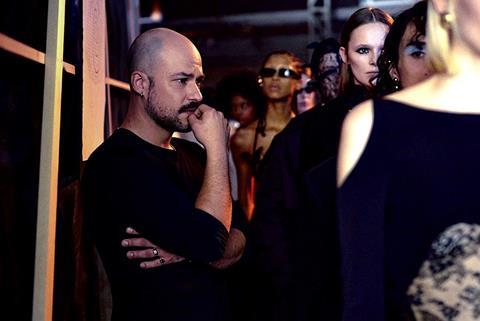Marc-Andre Grondin impresses as a lauded fashion designer forced back down to his roots in Xavier Legrand’s twisted art thriller

Dir/scr. Xavier Legrand. France/Canada/Belgium. 2023. 107mins.
There is something strong in Xavier Legrand which compels him to return forcefully to the subject of male violence against women: following on from his tense 2017 debut Custody, The Successor is an unexpectedly aggressive assault on viewer nerves given its intelligent, near-esoteric reach. (Themes here range back to Oedipal times.) Highly effective both as a claustropobic thriller and a jarring confrontation of what-makes-a-man, this stylish French feature competes at San Sebastián where a central performance from Marc-Andre Grondin seems certain to attract attention.
Highly effective both as a claustropobic thriller and a jarring confrontation of what-makes-a-man
The Successor’s narrative cannot be described as its surprises need to be closely guarded: the film’s success entirely rests on this complicity between film-maker and audience. Neither Legrand nor Grondin are well enough known yet to automatically sell tickets or even draw headlines outside of France (where Custody won Best Film at the Cesars for Legrand in 2019), thus MK2 will need to rely on strong notices and word-of-mouth – even if they are restricted in what they can say. Yet this is a feature which will travel very well once the ball starts to roll. Part of its attraction is its sharpness, meaning it should play widely within the arthouse market as well as to those who like an electric shock: from the very first moment, where fashion models parade along a Fibonacci arc, Legrand is suggesting something primal and disturbing.
That money sequence is the first collection to be presented by Elias Barnes (Grondin) at the fashion house Orsino: he is putting his own stamp on a label created by another man. It is a huge success — both on-screen, for Elias, and for the viewer, with a knock-out staging accompanied by composer SabastiAn’s dizzying sonic waves. Elias does not present as a big personality: he wears pretty conventional clothes for a fancy Parisian couturier, a little like a buttoned-down Alexander McQueen in casual garb as he jogs across the stage to rapturous applause. The clothes, too, are attractive, but not particularly outre or sexualised. The strongest colour is a canary yellow which will be the film’s unsettling strident visual note — everything else is about to fall back.
Elias is experiencing pains across his chest which seem to be stress-related, but they make him think of his long-estranged father, who suffered a stroke three years prior. Could this be hereditary? When he receives news that his dad has died in Montreal, and his mother — seemingly now shacked up with his uncle, his father’s brother — refuses to have anything to do with it, Elias is obliged to make a quick return to Canada to deal with affairs. And his health is foremost on his mind (certainly moreso than the loss of his father: he agrees to use a recycled coffin with the ashes to go into the carpark bin).
Elias, and the viewer, are now leaving the cosseted world of haute couture behind for an anonymous Montreal bungalow in a drab suburb of a country he hasn’t visited in two decades. It’s a regression, for sure: to a time when he spoke Quebecois and was called Sebastian. Seemingly out of nowhere, the film assumes a tone of significant unease. Who is he? Who was his father? Who are these strange over-friendly neighbours given to wandering over to his father’s house in the snow and ice?
The shocks, when they come, are hard-hitting, and, of course, nothing comes out of nowhere in a film this sharply-executed. Legrand has been layering it all on while the audience lagged a few steps behind: Elias taking over the fashion house, ‘killing’ his predecessor’s muse for a fashion shoot; Elias taking over his father’s house. A distant mother, off with his uncle: is he Legrand’s Hamlet?
A lot is asked of Marc-Andre Grondin and a lot is delivered (much as with Denis Menochet in Custody, this isn’t supposed to be likeable). Elias/Sebastian is a buttoned-down character giving a very physical performance, and the actor suggests every inch of that shredding conflict in his presentation. Without his conviction, the film could not work; there are severe tonal shifts to overcome as the film makes its succession of increasingly baroque swerves, and Grondin has to carry them alone. One might expect to see this marked by awards notice, either at San Sebastian or, again, the Cesars.
The Successor delivers a succession of jolts, and none of them are palatable. They’re all finessed, though, by a writer-director and technical team who know exactly what they’re doing, from the already-noted colour palette to camera work from Nathalie Durang which loves to soar and slam back down to, literally, earth. The film’s first sequences throb when there is nothing happening: when events start to rachet up in quick succession, The Successor becomes a muted visual experience. Bifurcated flashbacks and a panning trick to suggest the passing of time help to distract from some heavy-duty tension. Elias won’t be the only one with chest pains here.
Production companies: KG Productions, Metafilms, Stenola Productions
International sales: MK2, intlsales@mk2.com
Producer: Alexandre Gavras
Screenplay: Xavier Legrand
Cinematography: Nathalie Durang
Editing: Yorgos Lamprinos, Julie Wuillai
Production design: Sylvain Lemaitre, Jeremie Sfez
Music: SebastiAn
Main cast: Marc-Andre Grondin, Yves Jacques, Laetitia Isambert, Anne-Elisabeth Bosse, Blandine Bury, Vincent Leclerc
























